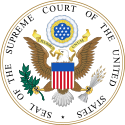User:Chaser/SCOTUS all
This is a list of notable cases decided by the United States Supreme Court.
This is a chronological list of notable cases decided by the United States Supreme Court during the tenures of Chief Justices John Jay (19 October 1789 - 29 June 1795), John Rutledge (15 February 1790 - 5 March 1791), and Oliver Ellsworth (8 March 1796 - 15 December 1800).
1789–1819
[edit]| Case name | Citation | Summary |
|---|---|---|
| Beginning of active duty of Chief Justice John Jay, October 19, 1789 | ||
| Hayburn's Case | 2 U.S. 409 (1792) | justiciability and separation of powers |
| Chisholm v. Georgia | 2 U.S. 419 (1793) | first “major” case; federal jurisdiction over suits vs. states; state sovereign immunity |
| Beginning of active duty of Chief Justice John Rutledge, August 12, 1795 | ||
| Talbot v. Janson | 3 U.S. 133 | admiralty and citizenship |
| Beginning of active duty of Chief Justice Oliver Ellsworth, March 8, 1796 | ||
| Hylton v. United States | 3 U.S. 171 (1796) | tax on carriages |
| Hollingsworth v. Virginia | 3 U.S. 378 (1798) | ratification of Eleventh Amendment, presidential approval is unnecessary for Constitutional amendment |
| Calder v. Bull | 3 U.S. 386 (1798) | ex post facto clause applies to criminal, not civil cases |
| New York v. Connecticut | (1799) | first original jurisdiction suit between two States |
|-
|colspan="3"|Beginning of active duty of Chief Justice John Marshall, February 4, 1801
|-
| Marbury v. Madison
| 5 U.S. 137 (1803)
| judicial review of laws enacted by Congress
|-
| Stuart v. Laird
| 5 U.S. 299 (1803)
| enforceability of rulings issued by judges who have since been removed from office
|-
| Little v. Barreme
| 6 U.S. 170 (1804)
| presidential and congressional power
|-
| Strawbridge v. Curtiss
| 7 U.S. 267 (1806)
| federal diversity jurisdiction
|-
| Ex parte Bollman
| 8 U.S. 75 (1807)
| habeas corpus, definition of treason, Supreme Court's power to issue writs to circuit courts
|-
| Fletcher v. Peck
| 10 U.S. 87 (1810)
| property rights
|-
| United States v. Hudson and Goodwin
| 11 U.S. 32 (1812)
| Federal court jurisdiction over common law crimes
|-
| Martin v. Hunter’s Lessee
| 14 U.S. 304 (1816)
| Loyalist property forfeiture, Supreme Court review of state court judgments
|-
| McCulloch v. Maryland
| 17 U.S. 316 (1819)
| doctrine of implied powers
|-
| Sturges v. Crowninshield
| 17 U.S. 122 (1819)
| constitutionality of state bankruptcy laws
|-
| Trustees of Dartmouth College v. Woodward
| 17 U.S. 518 (1819)
| impairment of contracts
|}
